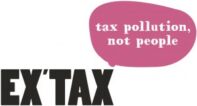about us
The Foundation
The Ex’tax Project Foundation is an independent think tank striving towards an update of our tax systems to combat global environmental and socio-economic challenges, such as the climate crisis, resource supply risks, poverty and unemployment.
The Ex’tax Project focuses on opportunities to increase taxes on resources and pollution, and using the revenues to lower the tax burden on labour and invest in social impact (the ‘taxshift’).
The Foundation raises support and creates alliances and practical tools that help advance the implementation of Ex’tax around the world.
The Ex’tax Project is a non-profit foundation (a Dutch ‘ANBI‘ or public benefit organisation). To do our work, we depend on the generous donations of our supporters.
Inspired by Eckart Wintzen
Ex’tax is inspired by the concept of ‘Value Extracted Tax’, a term coined by Eckart Wintzen (1939-2008) in 1990. He was a well-known Dutch entrepreneur who inspired many people. Often labeled as ‘management guru’, he was also a visionary thinker and pioneer in the field of sustainability.
In the 1990s Eckart Wintzen created BSO, an IT company of ultimately 10,000 employees with offices in 20 countries. He did this by applying his own management approach, the ‘cell structure’ that meant that employees worked in relatively independently operating groups. BSO was the first company to publish an integrated annual report in 1990, showing, amongst others, how much CO2 and waste the company had produced. The report also expressed the intrinsic value that was extracted from the environment by their use of natural resources. Eckart’s book about this period, Eckart’s Notes has been read by more than 50,000 people and continues to inspire a broad audience.
Value Extracted Tax
As an entrepreneur, Eckart was very aware of the fact that in our society, the tax burden on labour is high (due to social contributions, personal income tax and payroll tax) and/or rising. Natural resources, on the other hand, are hardly taxed and therefore they are used unrestrained. He noted that entrepreneurs, who want to compete and lower costs, will at first instance see if they can reduce the number of employees, even if that means using more resources and causing more pollution.
Eckart was worried about the effects of our current fiscal system. In his opinion, it was the root cause for the climate crisis, overconsumption of resources and unemployment. He wanted the economic system to shift towards taking better care of the planet and of people. This article explains his original opinion.
Pioneering in green investment
After selling his software business BSO/Origin in 1996, Eckart decided to ‘put his money where his mouth was’ and he initiated Ex’tent Green Venture Capital. A fund dedicated to help stimulate the free market economy to move towards welfare through services and digital entertainment rather than material consumerism. Ex’tent (Eckart’s tent) for example invested in Ben & Jerry’s (the ice cream) and Greenwheels (car sharing) and founded Ex’pression College for Digital Arts.
The future
After Eckart passed away, The Ex’tax Project was initiated to take over the baton and to continue with Eckart’s range of ideas.
Sustainable development is possible, but only if we begin managing the environment according to sound business principles. The goal of every company is to ensure its continuation and economic growth for the benefit of its employees and its shareholders. Is it not time then for us all, as equal shareholders in Earth Inc., to guarantee the sustainability of our own future prosperity? We must do this neither out of pie-in-the-sky idealism nor vague messianic ambitions, but out of pure economic necessity, a source of inspiration that has been the mother of so many fruitful inventions in the past."
Eckart Wintzen
The Ex'tax Project - knowledge partners

